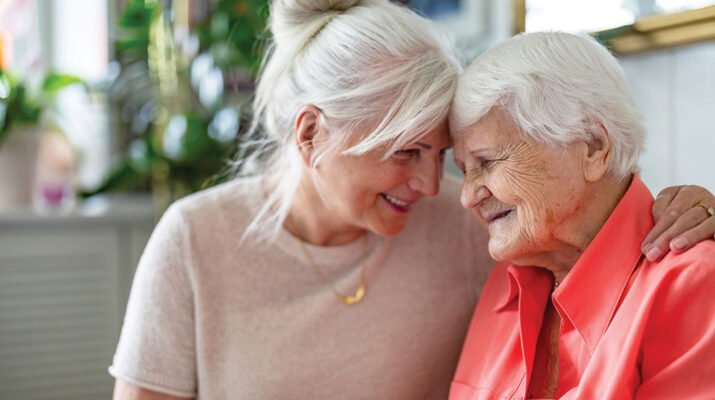Many resources can assist people caring for people with dementia
By Deborah Jeanne Sergeant
Taking care of someone with Alzheimer’s or another form of dementia brings many challenges. However, numerous community resources may help. For example, learning more about dementia may make caregiving easier.
“If you are caring for someone who has Alzheimer’s disease, there are educational programs, support groups and caregiver programs,” said Alexis Quinn, public health educator with Creating Healthy Schools and Communities, part of the Onondaga County Health Department. “Look into these programs.”
Although education is essential, caregivers should also remember that they know their loved one better than anyone else.
“I always try to remind caregivers that ‘you are the expert,’” said Bella Wheeler, licensed master social worker with University Geriatricians at Nappi Wellness Institute. “You know your loved one best: their personality, routines, hobbies and what tends to comfort or calm them. It’s OK to get creative and adapt our recommendations to fit your unique situation. What works for one person may not work for another and that’s completely normal. Take it one day at a time and know that you’re not alone in this journey.”
Wheeler encourages caregivers to seek support from local services, including respite services, to promote routines, meaningful structure and opportunities for social engagement.
“Participating in activities such as music, art, nature-based experiences, or group programs can ease anxiety, enhance emotional well-being, and help maintain a sense of identity,” Wheeler added. “When individuals are offered supportive environments where they can connect, express themselves and feel truly understood, they often show fewer behavioral challenges and enjoy a higher quality of life.”
Local agencies can also give caregivers a break so they can care for themselves.
She recommends in CNY to contact:
• “The Office for the Aging is a key resource. Local offices for the aging offer a wide range of free or low-cost services, such as caregiver respite programs, transportation and home-delivered meals.
• “Social day and engagement programs. These include social day programs as well as dementia-friendly engagement opportunities such as the M-Power U Arts Program, memory Care Corral and local Memory cafés. They offer safe, structured environments that provide stimulation, creative expression and connection for individuals with dementia while also giving caregivers time to rest or focus on other responsibilities.”
Another of the biggest resources nationwide but with local chapters is the Alzheimer’s Association, which Wheeler also recommends.
“The Alzheimer’s Association provides a variety of resources specifically designed to support family caregivers of individuals with Alzheimer’s disease,” said Jessica DesRosiers, senior director of programs & services for the CNY chapter. “These resources can be incredibly helpful in managing the emotional, physical and logistical challenges of caregiving.”
She listed as key educational resources such as online classes, webinars, brochures and downloadable guides about Alzheimer’s disease progression, communication strategies and daily care tips.
These “empower caregivers with knowledge to understand the disease stages, offer practical strategies for handling behavior changes and daily challenges and reduce uncertainty and anxiety by setting realistic expectations,” DesRosiers said.
The organization also operates a 24/7 helpline (1-800-272-3900) for free, confidential support from trained professionals around the clock.
“Caregivers can get immediate help during a crisis or when making difficult decisions,” DesRosiers said. “It offers emotional support at any hour, especially valuable during isolating or overwhelming times.”
The Alzheimer’s Association support groups include in-person and online groups for caregivers to commiserate and swap tips.
“The groups provide emotional support and reduce feelings of isolation, connect caregivers with others going through similar experiences, fostering a sense of community and give practical advice from peers can be more relatable than clinical recommendations,” she said.
If more direct help is needed, the organization’s care consultation services can give one-on-one sessions with dementia care experts to plan care and solve problems. DesRosiers said that this is tailored to each family’s needs and helps families “navigate difficult decisions, such as home care versus facility care.”
The Alzheimer’s Association’s legal and financial planning guidance offers information and tools to help with legal documents and financial planning. This can ensure the patient’s wishes are honored and it can also reduce stress for the family and caregivers.
As a national organization with local chapters, the Alzheimer’s Association offers community programming and local events.
“The Alzheimer’s Association supports caregivers through education, emotional support, crisis help, personalized planning, safety tools, legal/financial guidance and local services,” DesRosiers said. “These resources are crucial because caregiving for someone with Alzheimer’s is a long, emotionally intense journey, — and being informed, supported and connected can make all the difference.”

